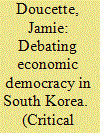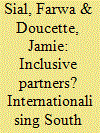| Srl | Item |
| 1 |
ID:
140251


|
|
|
|
|
| Summary/Abstract |
In the 2012 Korean presidential election, both liberal and conservative parties fought their campaigns on the slogan of “economic democratization,” marking a strong departure from past presidential elections and the growth-first policies of the then-incumbent conservative administration. Both parties pledged to tackle growing social polarization and the concentration of economic power by reforming the corporate governance of Korea's large, family-led conglomerates (chaebol), to the degree that chaebol reform itself became synonymous with economic democratization. This focus led to a series of heated exchanges among liberal-left reformers about the vision of economic democratization being promoted, with one camp favoring the creation of a “fair market” through the restructuring of the chaebol and another promoting the protection of the chaebol’s management rights over their affiliates as a desirable strategy for the creation of a Korean welfare state. This essay examines the long-standing tensions between these two liberal-left perspectives and argues that the capital-centric and market-based visions these camps promoted risk confining intellectual debate over the meaning of economic democracy within boundaries that serve dominant political interests.
|
|
|
|
|
|
|
|
|
|
|
|
|
|
|
|
| 2 |
ID:
174562


|
|
|
|
|
| Summary/Abstract |
In recent years, non-traditional or ‘emerging’ donors such as South Korea have organised their development cooperation models in a manner that seeks to complement the capacities of the private sector by extending the overseas activities of domestic businesses. To better understand this process, this article examines the role of South Korea’s large, family-led conglomerates (chaebol) in its growing international development sector. In particular, we focus on how the concept of corporate social responsibility (CSR) has been used to link the role of its large, and frequently scandal-ridden, private companies to international development, and, by extension, how it has helped to internationalise state–business networks long associated with the Korean developmental state. We examine two strategies through which this has been carried out. The first is by extending the logic of creating shared value (CSV, a derivative of CSR) to aid and infrastructure projects in which chaebol and other state-linked businesses have participated. The second is by directly embedding CSR-based aid initiatives in the value chains of the specific chaebol themselves.
|
|
|
|
|
|
|
|
|
|
|
|
|
|
|
|